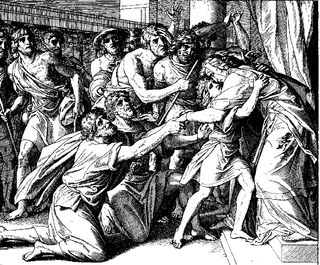
Privacy is the ability of an individual or group to seclude themselves, or information about themselves, and thereby express themselves selectively. The boundaries and content of what is considered private differ among cultures and individuals, but share common themes. When something is private to a person, it usually means that something is inherently special or sensitive to them. The domain of privacy partially overlaps with security (confidentiality), which can include the concepts of appropriate use, as well as protection of information. Privacy may also take the form of bodily integrity.

The United States Department of Education, also referred to as the ED for (the) Education Department, is a Cabinet-level department of the United States government. It began operating on May 4, 1980, having been created after the Department of Health, Education, and Welfare was split into the Department of Education and the Department of Health and Human Services by the Department of Education Organization Act, which President Jimmy Carter signed into law on October 17, 1979.

Banking in the United States began in the late 1790s along with the country's founding and has developed into highly influential and complex system of banking and financial services. Anchored by New York City and Wall Street, it is centered on various financial services namely private banking, asset management, and deposit security.
Griswold v. Connecticut, 381 U.S. 479 (1965), is a landmark case in the United States about access to contraception. The case involved a Connecticut "Comstock law" that prohibited any person from using "any drug, medicinal article or instrument for the purpose of preventing conception." The court held that the statute was unconstitutional, and that "the clear effect of [the Connecticut law ...] is to deny disadvantaged citizens ... access to medical assistance and up-to-date information in respect to proper methods of birth control." By a vote of 7–2, the Supreme Court invalidated the law on the grounds that it violated the "right to marital privacy", establishing the basis for the right to privacy with respect to intimate practices. This and other cases view the right to privacy as a right to "protect[ion] from governmental intrusion."
Consumer privacy is a form of information privacy concerned with the legal and political issues arising from the interaction of the public's expectation of privacy with the collection and dissemination of data by businesses or merchants. Consumer privacy concerns date back to the first commercial couriers and bankers who enforced strong measures to protect customer privacy. In modern times, the ethical codes of most professions specify measures to protect customer privacy, including medical privacy, client confidentiality, and national security. Since most organizations have a competitive incentive to retain exclusive access to customer data, and since customer trust is usually a priority, many companies adopt security engineering measures to protect customer privacy.
Information privacy is the relationship between the collection and dissemination of data, technology, the public expectation of privacy, legal and political issues surrounding them. It is also known as data privacy or data protection,
The right to privacy is an element of various legal traditions to restrain governmental and private actions that threaten the privacy of individuals. Over 150 national constitutions mention the right to privacy.

The Health Insurance Portability and Accountability Act of 1996 was enacted by the 104th United States Congress and signed by President Bill Clinton in 1996. It was created primarily to modernize the flow of healthcare information, stipulate how Personally Identifiable Information maintained by the healthcare and healthcare insurance industries should be protected from fraud and theft, and address limitations on healthcare insurance coverage.

The Privacy Act of 1974, a United States federal law, establishes a Code of Fair Information Practice that governs the collection, maintenance, use, and dissemination of personally identifiable information about individuals that is maintained in systems of records by federal agencies. A system of records is a group of records under the control of an agency from which information is retrieved by the name of the individual or by some identifier assigned to the individual. The Privacy Act requires that agencies give the public notice of their systems of records by publication in the Federal Register. The Privacy Act prohibits the disclosure of information from a system of records absent of the written consent of the subject individual, unless the disclosure is pursuant to one of twelve statutory exceptions. The Act also provides individuals with a means by which to seek access to and amendment of their records and sets forth various agency record-keeping requirements. Additionally, with people granted the right to review what was documented with their name, they are also able to find out if the "records have been disclosed".. and are also given the rights to make corrections.

The Freedom of Information Act (FOIA), 5 U.S.C. § 552, is a federal freedom of information law that requires the full or partial disclosure of previously unreleased information and documents controlled by the United States government upon request. The Act defines agency records subject to disclosure, outlines mandatory disclosure procedures, and defines nine exemptions to the statute. President Lyndon B. Johnson, despite his misgivings, signed the Freedom of Information Act into law on July 4, 1966, and it went into effect the following year.
Privacy International (PI) is a UK-based registered charity that defends and promotes the right to privacy across the world. First formed in 1990, registered as a non-profit company in 2002 and as a charity in 2012, PI is based in London, UK. Its current executive director, since 2012, is Dr Gus Hosein.
Katz v. United States, 389 U.S. 347 (1967), was a landmark United States Supreme Court case discussing the nature of the "right to privacy" and the legal definition of a "search" of intangible property, such as electronic-based communications like telephone calls. The Court's ruling refined previous interpretations of the unreasonable search and seizure clause of the Fourth Amendment to count immaterial intrusion with technology as a search, overruling Olmstead v. United States and Goldman v. United States. Katz also extended Fourth Amendment protection to all areas via the "Katz test" to determine when a person has a "reasonable expectation of privacy". The Katz test has been used in numerous cases, particularly with the advancement of technology that pose new questions on expectations of privacy.

Personal data, also known as personal information, personally identifying information (PII), or sensitive personal information (SPI), is any information relating to an identifiable person.
Human rights in Greece are observed by various organizations. The country is a signatory to the European Convention on Human Rights, the Geneva Convention relating to the Status of Refugees and the United Nations Convention Against Torture. The Greek constitution also guarantees fundamental human rights to all Greek citizens.
The Privacy and Civil Liberties Oversight Board (PCLOB) is an independent agency within the executive branch of the United States government, established by Congress in 2004 to advise the President and other senior executive branch officials to ensure that concerns with respect to privacy and civil liberties in the United States are appropriately considered in the development and implementation of all laws, regulations, and executive branch policies related to terrorism.
Privacy law refers to the laws that deal with the regulating, storing, and using of personally identifiable information of individuals, which can be collected by governments, public or private organisations, or other individuals.
Information sensitivity is the control of access to information or knowledge that might result in loss of an advantage or level of security if disclosed to others.

The Right to Financial Privacy Act of 1978 is a United States federal law, Title XI of the Financial Institutions Regulatory and Interest Rate Control Act of 1978, that gives the customers of financial institutions the right to some level of privacy from government searches.
Chief Privacy Officer, Department of Homeland Security is an appointed position within the United States Department of Homeland Security, which is part of the federal government of the United States in the United States. The chief privacy officer also serves as the chief Freedom of Information Act (FOIA) officer at the Privacy Office of the U.S. Department of Homeland Security.
Information technology law concerns the law of information technology, including computing and the internet. It is related to legal informatics, and governs the digital dissemination of both (digitalized) information and software, information security and electronic commerce. aspects and it has been described as "paper laws" for a "paperless environment". It raises specific issues of intellectual property in computing and online, contract law, privacy, freedom of expression, and jurisdiction.






